
Derry, officially Londonderry, is the largest city in County Londonderry, the second-largest in Northern Ireland and the fifth-largest on the island of Ireland. The old walled city lies on the west bank of the River Foyle, which is spanned by two road bridges and one footbridge. The city now covers both banks.

The counties of Ireland are historic administrative divisions of the island. They began as Norman structures, and as the powers exercised by the Cambro-Norman barons and the Old English nobility waned over time, new offices of political control came to be established at a county level. The number of counties varied depending on the time period, however thirty-two is the traditionally accepted and used number.
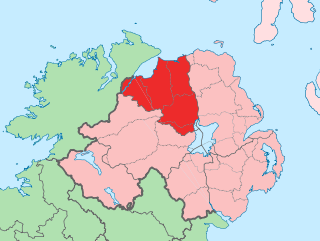
County Londonderry, also known as County Derry, is one of the six counties of Northern Ireland, one of the thirty-two counties of Ireland and one of the nine counties of Ulster. Before the partition of Ireland, it was one of the counties of the Kingdom of Ireland from 1613 onward and then of the United Kingdom after the Acts of Union 1800. Adjoining the north-west shore of Lough Neagh, the county covers an area of 2,118 km2 (818 sq mi) and today has a population of about 252,231.

John Hume was an Irish nationalist politician in Northern Ireland and a Nobel Peace Prize laureate. A founder and leader of the Social Democratic and Labour Party, Hume served in the Northern Ireland Parliament; the Northern Ireland Assembly including, in 1974, its first power-sharing executive; the European Parliament and the United Kingdom Parliament. Seeking an accommodation between Irish nationalism and Ulster unionism, and soliciting American support, he was both critical of British government policy in Northern Ireland and opposed to the republican embrace of "armed struggle". In their 1998 citation, the Norwegian Nobel Committee recognised Hume as an architect of the "Good Friday" Belfast Agreement. For himself, Hume wished to be remembered as having been, in his earlier years, a pioneer of the credit union movement.
An Order-in-Council is a type of legislation in many countries, especially the Commonwealth realms. In the United Kingdom, this legislation is formally made in the name of the monarch by and with the advice and consent of the Privy Council (King-in-Council), but in other countries the terminology may vary. The term should not be confused with Orders of Council, which are made in the name of the Council without sovereign approval.
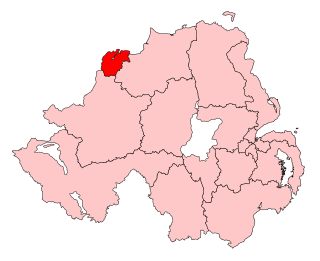
Foyle is a constituency in Northern Ireland covering Derry, represented in the House of Commons of the UK Parliament. Its current Member of Parliament (MP) has been Colum Eastwood of the Social Democratic and Labour Party (SDLP) since 2019.

City of Derry Airport, previously known as RAF Eglinton and Londonderry Eglinton Airport, is a regional airport located 7 mi (11 km) northeast of Derry, Northern Ireland. It is located on the south bank of Lough Foyle, a short distance from the village of Eglinton and 8 mi (13 km) from the city centre.

Foyle College is a co-educational non-denominational voluntary grammar school in Derry, Northern Ireland. The school's legal name is Foyle and Londonderry College. In 1976, two local schools, Foyle College and Londonderry High School, merged under the Foyle and Londonderry College Act 1976 to form Foyle and Londonderry College. In 2011, the Board of Governors re-branded the school as 'Foyle College' and updated the school's crest.
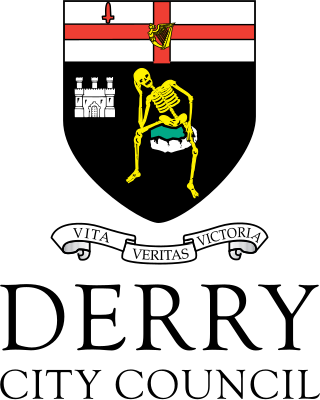
Derry City Council was the local government authority for the city of Derry in Northern Ireland. It merged with Strabane District Council in April 2015 under local government reorganisation to become Derry and Strabane District Council.
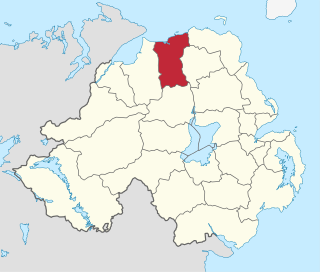
Coleraine Borough Council was a local council mainly in County Londonderry and partly in County Antrim in Northern Ireland. It merged with Ballymoney Borough Council, Limavady Borough Council and Moyle District Council in May 2015 under local government reorganisation in Northern Ireland to become Causeway Coast and Glens District Council
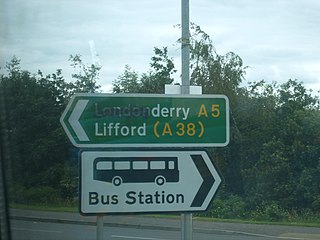
The names of the city and county of Derry or Londonderry in Northern Ireland are the subject of a naming dispute between Irish nationalists and unionists. Generally, although not always, nationalists favour using the name Derry, and unionists Londonderry. Legally, the city and county are called "Londonderry", while the local government district containing the city is called "Derry City and Strabane". The naming debate became particularly politicised at the outset of the Troubles, with the mention of either name acting as a shibboleth used to associate the speaker with one of Northern Ireland's two main communities. The district of Derry and Strabane was created in 2015, subsuming a district created in 1973 with the name "Londonderry", which changed to "Derry" in 1984.

The Local Government Act 1972 was an act of the Parliament of Northern Ireland that constituted district councils to administer the twenty-six local government districts created by the Local Government (Boundaries) Act 1971, and abolished the existing local authorities in Northern Ireland.
Borough status is granted by royal charter to local government districts in England, Wales and Northern Ireland. The status is purely honorary, and does not give any additional powers to the council or inhabitants of the district. In Scotland, similarly chartered communities were known as royal burghs, although the status is no longer granted.
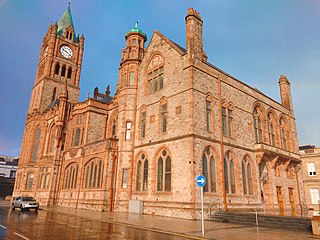
The Guildhall in Derry, Northern Ireland, is a guildhall in which the elected members of Derry City and Strabane District Council meet. It is a Grade A listed building.
In Ireland, the term city has somewhat differing meanings in Northern Ireland and the Republic of Ireland.
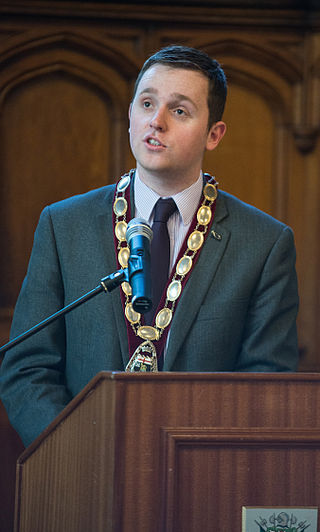
The first election to the new Derry and Strabane District Council took place on 22 May 2014, as part of the Northern Ireland local elections that year.
Gerry Mullan is a former Social Democratic and Labour Party (SDLP) politician from Limavady, County Londonderry, Northern Ireland. He was an Member of the Legislative Assembly (MLA) for East Londonderry from 2016 until 2017, when he was deselected by the SDLP in favour of John Dallat, who returned to politics following a short retirement.
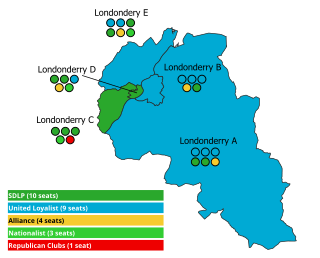
The 1973 Londonderry City Council election took place on 30 May 1973 to elect members of Londonderry City Council in Northern Ireland. This was on the same day as other Northern Irish local elections. The campaign was significant in that, following changes to the election process and districts, Irish nationalist parties were able to take control of the council for the first time.

Cara Hunter MLA is an Irish Social Democratic and Labour Party (SDLP) politician, currently serving as a Member of the Northern Ireland Assembly (MLA) for East Londonderry, a position she has held since 18 May 2020.
















